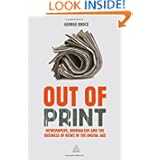 Legacy print and television media will almost certainly go out of existence before anyone employed there grasps the significance of design in nature or of any other non-material concept.
Legacy print and television media will almost certainly go out of existence before anyone employed there grasps the significance of design in nature or of any other non-material concept.
Pity the ink-stained wretch—but not too much. He was well on his way to becoming a self-satisfied bore, grovelling to trendy politicians, the moment washable ink was invented.
From a Times Literary Supplement review of George Brock’s Out of Print:
Satellite and cable television, and then, especially, the internet, have brought the protected position of big news organizations to a sudden end, and made the underlying erosion of the newspaper audience more obvious. Previously, defining journalism had been easy, at least for journalists. As Brock puts it, “Journalists were people who worked for these quasi-industrial organizations”. Much of what news organizations produced was replicative – substantial press packs covered the same stories in roughly the same way – or was merely a repackaging of public information. But, operating from their safe perch, journalists could tell themselves that if they produced something, it must have economic and social value. Those comfortable assumptions are now gone. As a business, newspapers have been subjected to devastating competition from new entrants in advertising sales and in information provision. As a social activity, they have had to meet a much higher standard of originality and distinctiveness.
The situation in journalism is changing so rapidly that it is difficult to get a sure sense of what is going on. There is a great deal of discussion but it mainly takes place in an endless series of panel debates and blog posts where there are plenty of confident assertions, but not much reliable data. Roughly speaking, the discussants divide into two teams: Team Digital, whose members are quick to predict the imminent and not especially tragic death of the familiar news organizations, and Team Mainstream Media, whose members look hopefully at every new development for evidence to support their wish for a restoration of the good old days. When Buzzfeed raises millions of dollars from venture-capital firms, or a member of the public with an iPhone produces the first picture of a breaking news event and posts it to a global audience, Team Digital proclaims victory. When the New York Times introduces a reasonably successful online subscription system, Team Mainstream Media does. The great virtue of Brock’s book is that it deals comprehensively, intelligently and unsentimentally with the entire range of major questions about journalism now. Although it doesn’t present a lot of new information, it is the best single source available for context about the situation as a whole.
😉 Fortunately, the 1970s didn’t tie us up on the analog phone long. As reviewer Nicholas Lemann notes, “It is difficult to say with a straight face, and George Brock does not, that the fabled ‘new business model’ for news – that members of Team Mainstream Media often see just around the corner – has arrived, or will arrive any time soon.”
What will come next, actually, will be an epic battle for freedom of the media, now that the media’s freedom matters (because new media often do not follow party lines). Like I said to some embattled Canadian bloggers (embattled because they were reporting stuff that legacy media don’t because Top People and chatterati don’t like people hearing that stuff): You, and we, are the media now.
For a similarly profound shakeout coming to science media in particular, see “Nobelist Schekman spells out his challenge to science journals” and “Nobelist Randy Schekman boycotting Nature, Cell, and Science.”
Follow UD News at Twitter!
